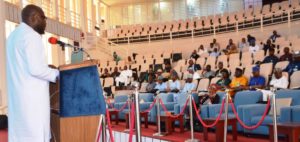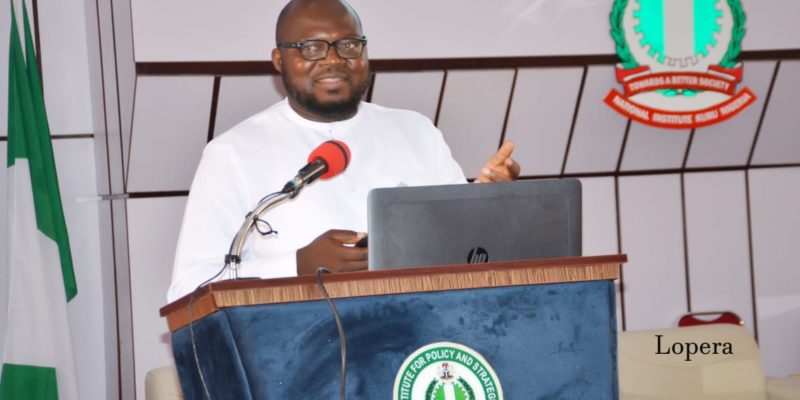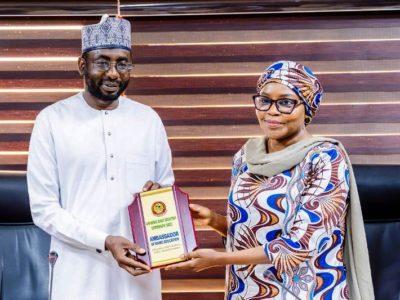
Daser David: Achieving sustainable job creation and youth empowerment in Nigeria’s digital economy requires a long-term strategic vision
Mr. Daser David, former Director General of Plateau State ICT Development Agency (PICTDA) and current Director of Public Policy and Start-up Growth at nHub Nigeria, was invited by the National Institute for Policy and Strategic Studies (NIPSS) Kuru to address the distinguished Senior Executive Course 46, 2024 Participants on the topic of “Stakeholders/Actors in Digital Economy, Youth Empowerment, and Sustainable Job Creation.”
RELATED: From participants to professionals: Enhancing the #3MTT initiative through internship policies
The invitation to David, a recognized expert in the field with extensive experience, underscores the importance of his insights in shaping policy and strategy in Nigeria’s digital landscape. His lecture was aligned with the theme of the 46th cohort, “Digital Economy, Youth Empowerment, and Sustainable Job Creation,” as approved by the President Bola Tinubu.
Digital economy drives innovation, economic growth, and societal development
During his engaging presentation, David emphasized the pivotal role of the digital economy in driving innovation, economic growth, and societal development. He highlighted the significant youth demographic in Nigeria, with 70% of the population being young people, and underscored the urgent need to leverage the digital economy to address youth unemployment and empower the next generation.
David, founder of nHub – the first tech/innovation hub in Northern Nigeria – provided conceptual clarity and real-life examples to illustrate the potential of the digital economy in creating sustainable job opportunities. He showcased success stories such as Andela, Farmcrowdy, and Flutterwave, which have revolutionized sectors like technology, agriculture, and finance, respectively, by harnessing digital technologies.
Furthermore, David discussed ongoing initiatives like the Federal Ministry of Communications, Innovation and Digital Economy’s Three Million Technical Talents program (3MTT) and projects like Project 774 LG connectivity and Rural and Digital Inclusion Project aimed at expanding internet access and digital infrastructure across Nigeria.
According to him, achieving sustainable job creation and youth empowerment in Nigeria’s digital economy requires a long-term strategic vision. Policymakers and stakeholders must adopt a holistic approach that considers the evolving nature of technology, changing market dynamics, and socio-economic trends. Continuous monitoring and evaluation of policies and programs are essential to ensure their effectiveness and relevance in addressing emerging challenges and opportunities.
Policies must promote entrepreneurship and incentivize digital job creation
In his recommendations, David emphasized the importance of promoting entrepreneurship, incentivizing digital job creation, and ensuring digital inclusion through policies and programs. He advocated for a multi-stakeholder approach involving collaboration between government, private sector, civil society, educational institutions, and young people to drive sustainable job creation and youth empowerment.
The interactive session allowed participants to engage with David on various case studies and explore solutions to challenges in the digital economy. Key takeaways included the importance of creating an enabling environment for collaboration, expanding digital skill sets, and fostering strategic partnerships between the public and private sectors.
David reiterated the transformative potential of the digital economy in driving Nigeria’s economic growth and development. He underscored the government’s commitment to the digital agenda through initiatives like the National Digital Economy Policy and Strategy (NDEPS), which aims to accelerate the nation’s digital transformation and foster innovation and entrepreneurship in the technology sector.
Nigeria’s digital economy has significantly contributed to GDP growth
Overall, Nigeria’s digital economy has significantly contributed to the country’s GDP growth. In Q2 2022, the ICT sector accounted for 18.44% of Nigeria’s GDP, surpassing the oil sector’s 6.33% contribution. This shift is attributed to the growth of the non-oil sector, which contributed 93.67% to the nation’s GDP in Q2 2022, a 4.77% increase from the previous rate. The implementation of the National Digital Economy Policy and Strategy (NDEPS) has further boosted the digital economy.
The Nigerian government recognises ICT as a catalyst for developing other critical sectors, including education, healthcare, agriculture, and manufacturing, and is encouraging partnerships between local ICT companies and foreign investors. The government has also supported government or private sector-led incubator hubs, youth innovation programs, and science technology parks to promote these partnerships and grow an entrepreneurial ecosystem in the technology sector.
The launch of the NDEPS (2020-2030) is aimed at accelerating the Nigerian economy through eight pillars, including digital literacy and skills, solid infrastructure, digital services development and promotion, and digital society and emerging technologies, is another step towards boosting the digital economy.





























